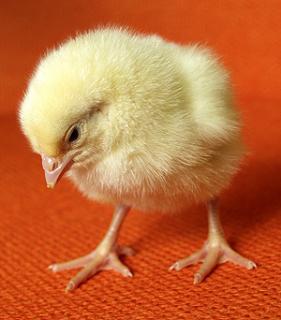
Health officials are again bracing for yet another wave of illness linked to Easter gifts of baby chicks and ducklings.
Last year 68 people got salmonella in 20 states from handling baby chicks and ducklings, according to the U.S. Centers for Disease Control and Prevention. Almost a third were under age 6.
CDC’s Casey Barton Bahravesh told USA Today’s Elizabeth Weise there have been more than 35 U.S. outbreaks of salmonella caused by exposure to chicks, ducklings and other live poultry since 1990, and  most of those who got sick were young children.
most of those who got sick were young children.
If you’re buying chicks, ask if the seller tests them for salmonella, says Douglas Powell, a professor of food safety at Kansas State University in Manhattan, Kan. "If they look at you like you’re crazy, you shouldn’t buy from them."
Stores say customers don’t always think through what they’ll do with a chick when it becomes a chicken. The surge in interest in backyard laying flocks has helped, because there are more friends and family willing to take in a cute chick that’s now a not-so-cute pullet, says Les Phillips of MyPetChicken.com, an online poultry supplier. But some chick buyers still "end up taking them to the local pet store to try to re-home them."
Half of all chicks are boys, and boy chicks grow up to be crowing roosters that can live for up to five years.
If that chick goes on to produce eggs, Professor Ben Chapman of North Carolina State University says hard boiled eggs used in egg hunts shouldn’t be eaten afterwards because the shells can crack, allowing bacteria to enter.
Officials at the U.S. Food and Drug Administration estimated 142,000 illnesses are caused each year by consumption of eggs contaminated with Salmonella, and that even eggs with clean, un-cracked shells may occasionally contain the bacteria Salmonella.
The FDA recommends to:
— Buy eggs only if sold from a refrigerator or refrigerated case.
— Open the carton and make sure that the eggs are clean and the shells are not cracked.
— Refrigerate promptly.
— Store eggs in their original carton and use them within three weeks for best quality.
— Wash hands, utensils, equipment, and work surfaces with hot, soapy water before and after they come in contact with eggs and egg-containing foods.
— Cook eggs until both the yolk and the white are firm. Scrambled eggs should not be runny.
— Casseroles and other dishes containing eggs should be cooked to 160 degrees F.
— For recipes that call for eggs that are raw or undercooked when the dish is served — Caesar salad dressing and homemade ice cream — use either shell eggs that have been treated to destroy Salmonella, by pasteurization or another approved method, or pasteurized egg products.
